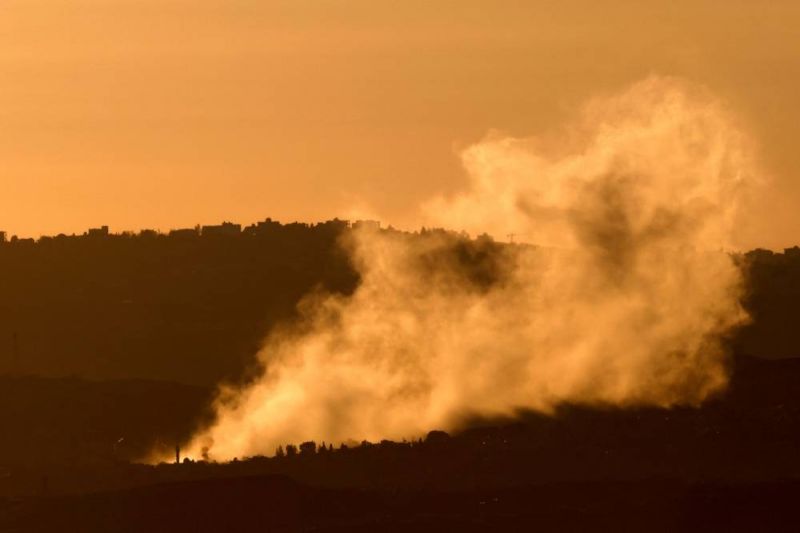
This picture taken from a position in northern Israel along the border with Lebanon shows smoke billowing above the Lebanese village of Blida during Israeli bombardment on Feb. 29, 2024. (Credit: Jalaa Marey/AFP)
Catch up on our LIVE coverage of Day 146 of the Gaza war here.
On Thursday night, Malaysian members of the United Nations Interim Force in Lebanon (UNIFIL) were stopped by Hezbollah when they entered Hay al-Sellom in Beirut's Southern Suburbs, an area well outside of the peacekeepers' mandate. The UNIFIL patrol was detained by Hezbollah who then proceeded to hand them over to Lebanon's state security forces. The reason given, at the time, for the patrol ending up in Beirut's Southern Suburbs was that there was an issue with their GPS which led them to the area. This is a developing story and we will bring you more details as they come in.
Israel refuses a return to the pre-war status quo with Hezbollah, senior US officials told CNN, while caretaker Prime Minister Najib Mikati expects negotiations leading to “long-term stability” in southern Lebanon to follow a cease-fire in Gaza. Mikati announced an upcoming visit by US envoy Amos Hochstein to Lebanon. The US envoy previously mediated the indirect maritime border negotiations between Lebanon and Israel which concluded in October 2022 — something that the caretaker premier said demonstrated the viability of a diplomatic solution. A Biden administration official claimed Israeli officials were split between those who view a ground incursion into Lebanon as a negotiating tactic and those who view it as a necessity. Another official interviewed by CNN said they were working with the assumption that Israel would launch a ground invasion into Lebanon within months. The same US officials, however, noted that this possibility would be offset by Hezbollah’s withdrawal from the border region. Israeli generals and politicians have repeatedly threatened to continue striking southern Lebanon even if a cease-fire begins in Gaza — Hezbollah’s condition to stop attacks — if it cannot guarantee the return of displaced residents to northern Israel. In a January speech, Hezbollah Secretary-General Hassan Nasrallah said the cross-border strikes, primarily a “support front” for Gaza, would leverage Lebanon’s position in post-war negotiations — notably regarding Israel’s continued occupation of the Shebaa farms and the northern part of Ghajar.
An Israeli airstrike Wednesday evening killed two civilians in southern Lebanon after striking houses and shops between Kafra (Bint Jbeil) and Siddiqine (Sour), L’Orient Today’s correspondent in the area reported yesterday. Several residents in Siddiqine were injured or hospitalized after Israel’s night-time air raids destroyed and damaged houses in the area and follow-up drone strikes impeded relief workers from accessing the sites, security sources told L’Orient Today’s correspondent in the region. Residents across southern Lebanon yesterday continued to report widespread shelling, while Hezbollah continued to announce several cross-border attacks. Hezbollah announced the death of three of its members, raising the number of party fighters killed since Oct. 8 to 222 by our count.
Still awaiting comprehensive pay-scale adjustments, public administration employees ended a weeklong strike in response to the cabinet’s Wednesday salary boosts. In a statement, the public administration employees’ union announced their provisional return to work pending a review of how their compensation, with the additional salaries and bonuses granted Wednesday by the caretaker cabinet, total compared to the cost of living, union member Ibrahim Nahhal told L’Orient Today. The union demanded adjustments “in line with current economic reality [a withered national currency causing triple-digit inflation]” to the public pay scale, last modified in 2017, which would include “all civil servants.” The Finance Ministry employees’ strike suspended the disbursal of February salaries while the work stoppage at the agriculture and economy ministries delayed container processing at the Beirut and Tripoli ports. Lagging public sector salary adjustments to the lira’s depreciation have, since the onset of the crisis in 2019, led to repeated, cross-sectorial protests mollified by palliative compensation adjustments.
Kuwait convicted three people of spying for Hezbollah and “seeking to propagate [the Iranian revolution and its principles]” in the country, according to a court statement reported by Kuwaiti news outlet al-Qabas. Alleged members and affiliates of Hezbollah, designated a terrorist group by several states, were arrested and prosecuted last year in Germany, the UAE, Brazil and Romania on charges including belonging to the group and promoting it, financing it and organizing purported bombings.
More than 30,000 people, including 13,230 children, have been killed in Gaza since Oct. 7, according to the latest figures from the enclave’s Health Ministry. Israeli soldiers shot starving Gazans, killing at least 104 people and wounding 700 others rushing for humanitarian aid in Gaza City. “Even after close to five months of brutal hostilities, Gaza still has the ability to shock us,” UN aid chief Martin Griffiths said in response to the incident. International agencies continued to warn of the growing risk of famine starving more than 2 million people in Gaza. Ramped-up aid deliveries, hostage releases and a respite from the daily atrocities have been postponed beyond Monday, Biden said revising an earlier prognosis as truce talks again faltered. Hamas yesterday evening published a video purporting to show three Israeli hostages, saying their fate would be revealed the next day. The group blames Israel for creating untenable conditions to deliver aid and keep the nearly 130 people being held hostage in the enclave alive.
In case you missed it, here’s our must-read story from yesterday: “Dropping food aid over Gaza coast causes controversy”
Compiled by Abbas Mahfouz